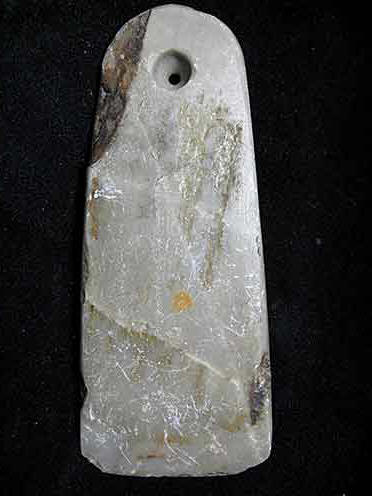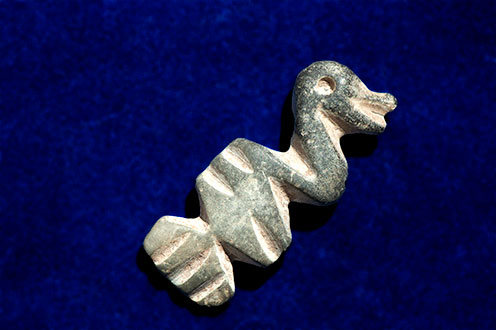| |
Native American Relics
 I'm creating these
pages as a way to catalogue my collection and learn about point typology.
It's also the place where I'll be recording the notes I take while doing
research on ancient America. These points are not for sale though I am
occasionally interested in purchasing old collections especially if they are
personal finds. Personal recollections by the finder about the finding of the
artifacts are definitely of interest to me. Many times the story is more
interesting than the point itself. I'm creating these
pages as a way to catalogue my collection and learn about point typology.
It's also the place where I'll be recording the notes I take while doing
research on ancient America. These points are not for sale though I am
occasionally interested in purchasing old collections especially if they are
personal finds. Personal recollections by the finder about the finding of the
artifacts are definitely of interest to me. Many times the story is more
interesting than the point itself.
Rob Horne
Historic Points
Pre-Columbian to modern times |
Mississippian
Points
400 B.P. to 1300 B.P. |
Woodland Points
1300 B.P. to 3,000 B.P. |
Late Archaic Points
3,000 B.P. to 5,000 B.P. |
Mid Archaic
Points
5,000 to 6,500 B.P. |
Early
Archaic Points
6,500 to 9,000 B.P. |
Paleo Points
9,000 B.P. to 11,500 B.P. |
|
Stone Tools - Celts, Net weights, Axes, Banner Stones |
|
Dalton's |
Pendants & Gorgets |
|
Ex-Stagecoach
Lane Collection |
Ex-Stangland
Collection |
Ex-Lillian
Martel Collection |
Point Notes |
| |
|
Musical Instruments |
Pendants &
Gorgets
Native Americans are believed
to have used gorgets for several different purposes. They were objects of
importance that might have indicated tribal or clan membership, served as
expressions of personal rank or social status, or perhaps served as charms that
were believed to possess certain earthly and supernatural powers. The majority
of them were made during the Late Archaic to the Late Woodland periods
approximately 4,500 to 1,500 years ago.
Slate gorgets have often been
reported from burials. But, Webb and Snow (1945) writes that "There seems to
have been little or nothing observed in their actual occurrence in burial
associations to justify the term gorget." They point out that some gorgets were
found with burials in the region of the hips or lower extremities. They suggest
that some of them could have been used as atlatl weights. They describe one
burial that contained a well worked antler handle that was found in alignment
with the stone gorget at the proper distance that suggested they were both part
of an atlatl. But they also report that reel-shaped gorgets were found in
positions around the necks of other individuals. In another source, Moorehead
(1892) describes a burial where "On the head of the second skeleton was a fine
slate gorget."
"The
term (gorget) applied to objects worn in some proximate relation with the gorge
(throat) or throat. They may be suspended by a string or chain encircling the
neck, or may be attached to the dress"----1912,
by Frederick Webb Hodge, "Handbook of American Indians North of Mexico, part 1,
p. 496.
"(Gorgets)---may be simple ornaments not differing materially in form or
significance from those used to embellish the ears, hair, wrists, or they may
have special significance as symbols, insignia, charms, etc."----1912,
by Frederick Webb Hodge, "Handbook of American Indians North of Mexico, part 1,
p. 496.
"Gorgets or "pierced tablets" constitute another class of polished "slates" of
the problematical class, of considerable interest to the archaeologist."----1917,
by Warren K. Moorehead, "Gorgets," Stone Ornaments Used By Indians In The United
States And Canada, pp. 204-225.
"The difference between the gorget and pendant seems only to have been in the
number and position of the holes,"----1896,
by Thomas Wilson, "Prehistoric Art; of The Origin of Art As Manifested In The
Works Of Prehistoric Man," Report Of The U.S. National Museum, p. 452.
"Most of them (gorgets) are made of slate, thin, not difficult to make, nor yet
particularly beautiful when made"----1896,
by Thomas Wilson, "Prehistoric Art; of The Origin of Art As Manifested In The
Works Of Prehistoric Man," Report Of The U.S. National Museum, p. 452.

|

|
Indiana
Slate Gorget
L 4-1/4" W 1-3/4" |

|

|
Banded Slate
Pendant
Adams Co. Ohio.
L 3-9/16" W 1-13"16 & 7/16" thick
Banded Slate

Ken Partain COA |

|

|
Zomorphic Pendant
Amapa Nayarit, West Mexico
H 1-1/2" W 5/8"
Steatite
A.D. 1200 to A.D. 1400

Ben Stermer COA |
Back to Top
| |
|
Useful
Resources
|
|
|

Authentic
Artifact
Collectors
Association
______
Overstreetid.com
The Official Overstreet Indian
Arrowhead Identification Online Database
______
|
|
|
|
|
|
|